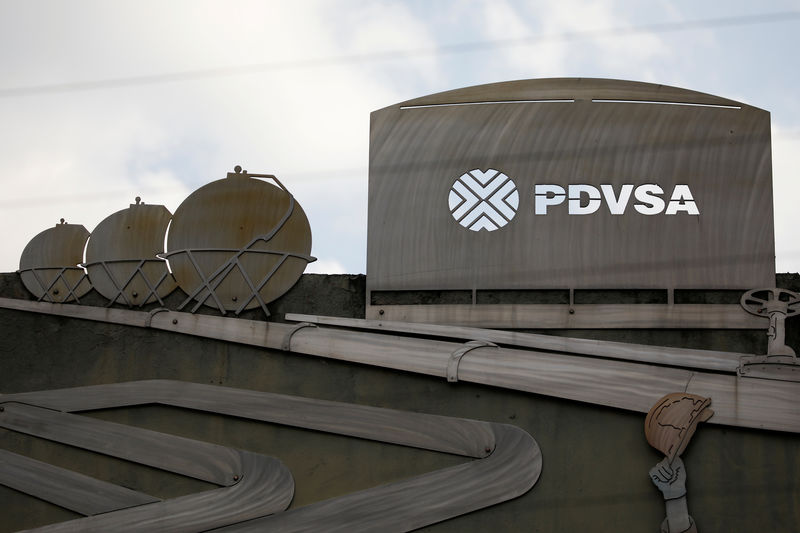By Corina Pons and Mayela Armas
CARACAS (Reuters) - T. Rowe Price has held informal talks with advisors of Venezuelan opposition leader Juan Guaido about financing a $913 million payment on state oil firm PDVSA's 2020 bond, an executive at the U.S. fund manager told Reuters, adding the plan would only work if Washington alters sanctions on Venezuela.
Guaido, who assumed an interim presidency in January after declaring President Nicolas Maduro's 2018 re-election a fraud, is seeking to ensure payment on the PDVSA 2020 because it is backed by shares in U.S. refiner Citgo that could be seized by creditors in the event of a default.
But such a plan would flounder under Trump Administration sanctions that prohibit U.S. companies from trading any Venezuelan securities.
"We have had informal discussions with the Guaido team ... , but no transaction is possible because of the trading ban on U.S. investors," said T. Rowe Price portfolio manager Mike Conelius.
"T Rowe Price as part of the Venezuela Creditor Committee has expressed the view (that) bondholders would consider new money assistance to help with the 2020 payment, but it's impossible while there is a trading ban on existing bonds."
The Venezuela Creditor Committee is a group of investors who hold bonds issued by Venezuela and PDVSA that are almost all in default because Maduro stopped paying them in 2018 amid the country's economic meltdown.
T. Rowe Price did not make a formal proposal due to the trading ban, Conelius said.
Financing the PDVSA 2020 payment would most likely require PDVSA to issue a new security to the financier in exchange for the fresh funding.
The financier would then be unable to sell the new security, which would make the operation unattractive.
The U.S. Treasury Department and the Venezuela Creditor Committee, and Venezuela's information ministry did not reply to requests for comment.
Nor did PDVSA's ad hoc board, a group of Guaido allies appointed by Venezuela's opposition-run legislature that controls PDVSA's U.S. operations.
Guaido's team declined to comment.
PAYMENT APPEARS COMPLICATED
Two sources on Guaido's team said they have not asked the United States to lift the ban on trading Venezuelan securities. A third source linked to Guaido said raising additional funds would be expensive under current market conditions.
With only 60 days before the payment, it still is not clear if Guaido's team has other options on the table.
They continue hoping for an executive order from the Trump administration blocking creditor seizures, as Guaido has requested.
"We have no doubt that the government of the United States will issue an executive order to protect Venezuelan assets and facilitate a negotiation process," said one of the sources.
But the Trump administration has not done so, and some experts believe such a move would be seen as interfering in private transactions.
A law firm advising PDVSA 2020 bondholders believes that existing U.S. sanctions on Venezuelan assets would not prevent a creditor seizure, according to a document seen by Reuters.
Guaido's team earlier this year made a $71 million interest payment on the 2020 bond, avoiding a creditor seizure but raising sharp criticism within Venezuela.
Making the much larger October payment appears complicated.
The PDVSA ad hoc board does not control revenue from the company's day-to-day operations, which still accrue to Maduro's government.

Citgo's chairwoman last week said the refiner is not in a position to declare dividends to PDVSA, which had been one of the funding options discussed in opposition circles.